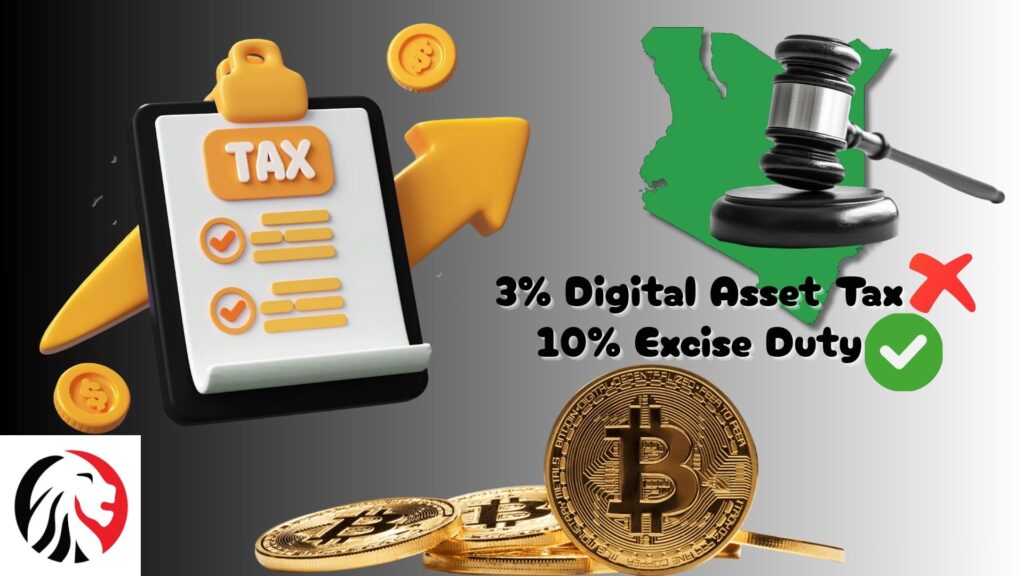
NAIROBI, Kenya — September 4, 2025.
Kenya just changed how it taxes crypto and other digital assets. Instead of taxing every trade directly, the government is shifting responsibility to exchanges and platforms. Here’s what that means for traders, businesses, and cross-border payments.
Kenyan members of parliament scrapped the controversial 3% Digital Assets Tax (DAT) and replaced it with a 10% excise duty on transaction fees. The shift is designed to ease the tax burden on traders and encourage broader cryptocurrency adoption across the country.
The change, which took effect on July 1, 2025, follows sustained pressure from industry stakeholders over DAT’s design as a withholding tax applied to the gross value of every crypto trade. Between September 2023 and June 2025, the Kenya Revenue Authority (KRA) collected KSh1.1 billion in revenue under the tax. Critics argued, however, that taxing deposits and gross transaction amounts stifled market growth and liquidity.
Explaining the move, Kuria Kimani, Chairperson of the Finance and National Planning Committee, said:
“This is the equivalent of being taxed for depositing money in your bank. We are now changing this to focus not on the transaction amount but on the fees charged when you trade using digital assets.”
Kimani further clarified for users that: “If you are using, say, Bitcoin to pay for a service, the law provides that you pay taxes on the transaction amount.”
The decision to tax platform fees rather than total trade amounts aligns crypto taxation with levies already imposed on banks and payment service providers. Industry players have welcomed this as a step toward unlocking digital currency adoption in Kenya.
What Does this Mean for Traders and Exchanges?
Under the new regime, the 10% excise duty applies to fees charged by crypto exchanges, peer-to-peer (P2P) marketplaces, and payment service providers. The tax liability now falls on intermediaries facilitating transfers rather than individual traders.
P2P transactions remain outside the scope of the duty if no platform fee is charged. However, enforcement remains challenging in decentralized systems with no clear party responsible for remitting taxes.

How Does this Affect Cross-Border Payments?
The new tax approach could reshape cross-border payments and stablecoin adoption in East Africa. On/off-ramp providers, which enable conversion between cryptocurrency and fiat currency, will now fall squarely under KRA oversight. This move brings crypto platforms closer to regulated financial service providers.
Kenya is also aligning with the OECD’s Crypto-Asset Reporting Framework (CARF), which mandates standardized reporting of digital asset transactions across borders. Analysts say this could improve visibility over remittances and informal cross-border payment flows, a key issue in a region dominated by mobile money services.
“Stablecoins are widely used for cross-border transfers, providing an alternative to traditional remittance channels that are often slow, expensive, and lack transparency. Stablecoins offer a faster, cheaper, and more accessible alternative. But to unlock their full potential, African regulators need a balanced approach, one that starts with monitoring and understanding these new tools before introducing clear, tailored rules instead of relying on outdated frameworks,” said Larry Cooke, Head of Legal at Binance Africa.

Double Taxation Concerns
Despite optimism, stakeholders warn that Kenya risks overtaxing crypto transactions. Traders may still face Value Added Tax (VAT) on capital gains from trades, airdrops, or token profits in addition to the 10% excise duty on platform fees.
Exchanges and wallets serving Kenyan users will also be required to implement stricter reporting and meet capital adequacy standards under a draft regulatory bill currently under review. The bill proposes insurance measures and tighter oversight to protect users and prevent fraud, signaling stricter compliance expectations for fintech and blockchain startups.
What Risks Remain?
While the duty is easier to administer on centralized platforms, decentralized exchanges (DEXs) and peer-to-peer networks pose regulatory challenges. Without centralized entities to withhold or remit taxes, KRA will have limited enforcement capabilities in permissionless systems.
Nickson Omondi, KRA’s Digital Economy Tax Officer, emphasized that the agency’s focus extends beyond tax collection:
“We’re not just here to collect taxes. We want to demystify compliance and support fair innovation.”
The Virtual Asset Service Providers (VASP) Bill names the Central Bank of Kenya (CBK) and Capital Markets Authority (CMA) as key regulators of digital transactions. This dual oversight structure aims to integrate the sector more closely with Kenya’s financial system while strengthening investor protection.
“Effective regulation must be timely. Overregulation kills progress, while underregulation creates loopholes,” said Larry Cooke, Binance’s Head of Legal for Africa, highlighting the difficulty of applying traditional compliance models to decentralized finance.

What are the Reactions Within the Sector?
Industry players have welcomed the repeal of DAT as a “pro-innovation” move that reduces friction for active traders and eliminates what many saw as a punitive tax on deposits.
Kenya’s shift comes amid rapid growth in crypto adoption. According to Chainalysis, Kenya ranked among the top 20 countries globally for cryptocurrency adoption in 2024, driven largely by stablecoin use for remittances and savings.
Stakeholders hope the updated tax model, coupled with CARF adoption, will bring regulatory clarity and strengthen Kenya’s position as a regional hub for digital asset innovation.
Kivindo Munyao, a tax advocate critical of the previous regime, said:
“The simplified tax regime under Section 12F of the Income Tax Act ignored the complexity of realizing crypto value and the unique transactions involved. Moving to an excise duty is a fairer and more predictable approach.”
Analysts believe the new model could encourage exchanges that had moved operations abroad to re-establish a presence in Kenya, benefiting from a clearer and more stable tax framework.